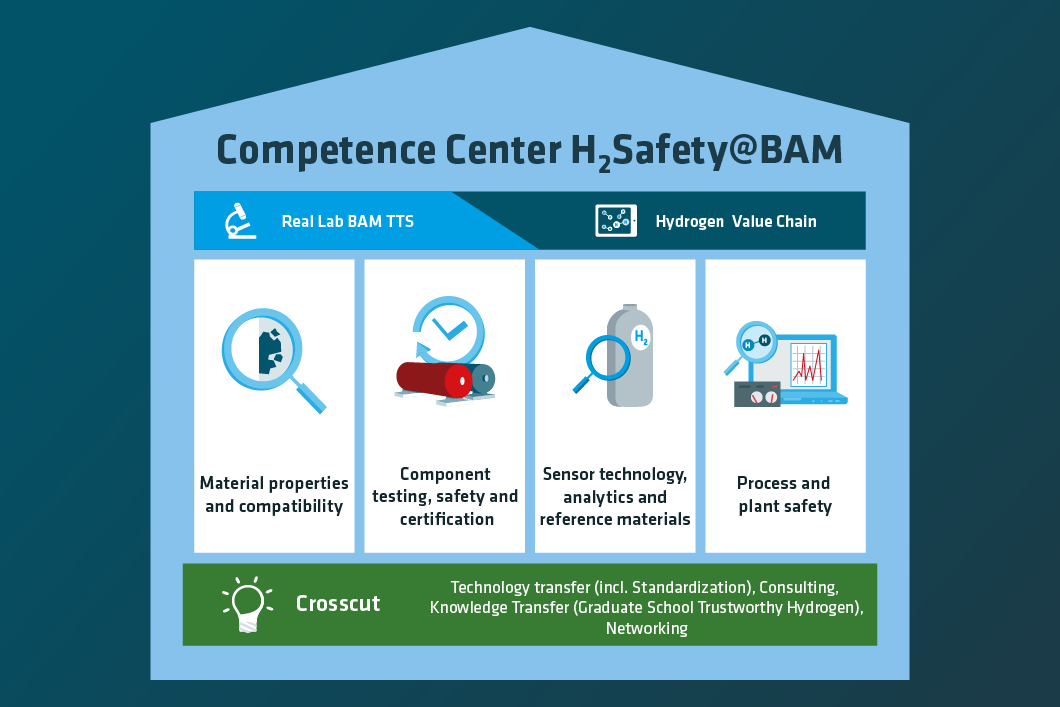Hydrogen: creating trust in the energy source of the future
BAM has pooled its expertise in the field of hydrogen technologies to form a Competence Center H2Safety@BAM in order to create confidence in the technology and support the implementation of the hydrogen strategies of the German government and the EU.
Hydrogen and its derivatives such as ammonia, synthetic LNG and eFuels are a central component of the energy transition and the European Green Deal for a climate-neutral Europe. The prerequisites for a successful transformation and the economic use of green hydrogen and its derivatives as clean energy carriers are H2 readiness and a rapid market ramp-up as well as the establishment of the necessary value chains within a national and European framework. Reliable quality and safety standards, in turn, are the prerequisite for ensuring security of supply and environmental compatibility and creating trust in these technologies.
Research into safe hydrogen technologies along the entire value chain
The H2Safety@BAM Competence Center conducts research into safety-related issues along the entire hydrogen value chain. The focus here is particularly on investigations into material suitability and compatibility, new concepts for component safety and testing, certifications, sensor technology and analytics as well as process and plant safety. BAM addresses these issues across all stages of development and scaling up to large and real scale in the real laboratory on the BAM Technical Safety Test Site. We are currently setting up infrastructures there, some of which are unique, in order to optimize digital quality assurance processes using the example of a hydrogen filling station (QI Digital) and to carry out investigations on pipelines and components on a real scale (ModuH2Pipe).
We are also involved in knowledge and technology transfer. For example, we have founded the Trustworthy Hydrogen graduate college together with BTU Cottbus, where we train young scientists for the hydrogen economy.
To promote uniform safety standards worldwide, BAM contributes its expertise to regulation and standardization.
H2Safety@BAM: Services and competences
Our expertise includes:
- the evaluation of materials and containment systems for transport
- the storage of hydrogen
- the development and evaluation of new measuring methods for gas mixtures
- the development of corresponding regulations, norms and standards
- Power-to-X technologies
- Sector coupling, especially with mobility
- the safety assessment of infrastructures including the energy production with wind power plants
At the same time a focus is placed on necessary cross-sectional areas. These include regulatory issues and know-how in risk management as well as the use of digital tools in quality management in order to make reliable, case-related forecasts.
Our fields of competence
Material properties and compatibility for hydrogen technologies
Component testing, component safety and approval
Analytics, sensor technology and certified reference materials

BAM's fields of competence in hydrogen technologies
Source: BAM
Detailed information on our activities and already completed hydrogen projects as well as on our test facilities and test technology can be found in our brochure "Hydrogen: Our contribution to safety" (PDF) .
Selected projects
NICOLHy - Novel Insulation Concepts For Liquefied Hydrogen Storage Tanks
ModuH2Pipe - Modular test platform for the safety of hydrogen pipelines
Safe and reliable hydrogen filling stations
MefHySto - Metrology for Advanced Hydrogen Storage Solutions
GW4SHM - Guided waves for structural health monitoring
PhoSten - Prevention of cold cracking in thick plate welds of high-strength steels
HySpark - Ignition of hydrogen-containing atmospheres by mechanically generated sparks
SH2APED - Storage of hydrogen: Alternative pressure enclosue development
TAHYA - Tank Hydrogen Automotive
Decarb - Metrology for decarbonising the gas grid
EMN for Clean Energy - Support for a European Metrology Network for Clean Energy
DELFIN
FLEXTemp
Phase transformation of LTT alloys
Cold cracking
Thermo-voltage based sensor technology
Find BAM research projects in the field of energy and other topics in the
ReSEARCH BAM database
Publications
Hydrogen: Our contribution to safety brochure, 09/2020 (PDF, 9MB)


